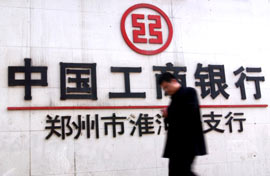|
China injects US$15b to overhaul State bank
(Agencies)
Updated: 2005-04-22 12:09
China announced plans today to inject US$15 billion into its biggest
State-owned commercial bank as part of efforts to turn it into a profitable,
freestanding competitor as Beijing opens its financial markets to foreign
rivals.

A man walks past a branch of the Inudustrial
and Commercial Bank of China in Zhengzhou, Central China's Henan Province
in this picture taken on March 23, 2005.
[newsphoto] |
The Industrial and Commercial Bank of China will use the money to replenish
its financial reserves, Xinhua reported. Like other state banks, ICBC is
burdened by unpaid loans issued to state companies.
China’s government is preparing its major state-owned commercial banks to
raise capital by selling shares for the first time to private investors,
including those abroad.
Regulators believe ICBC is "basically ready" to take such a step, Xinhua
said, though a date is not announced.
The amount given to ICBC is smaller than the $22.5 billion two other major
state-owned banks each received last January in the first stage of the banking
overhaul.
The money will come from China's foreign reserves, Xinhua said.
Until recently, China's state banks were treated as a source of money to prop
up failing state companies, leaving them with too little capital to meet
regulatory requirements.
Efforts to reform the industry have taken on added urgency as China prepares
to meet commitments to the WTO to open its financial markets to foreign
competitors by 2006.
ICBC, founded in 1984, is the biggest of China's four main state-owned
commercial banks by deposits. But Xinhua said it also faces the most serious
financial problems, with up to 20 percent of its loans considered unrecoverable.
Until recently, Chinese law barred state-owned banks from declaring loans to
state firms uncollectable and writing them off, leaving lenders with unpaid
lending on their books.
The government has begun turning over outstanding loans to a series of newly
created debt-management agencies, which try to obtain payment by seizing assets
or accepting shares in debtor companies.
A handful of Chinese banks have formed ventures with U.S., European and other
partners, benefiting from access to investment capital and more advanced banking
skills.
Last year, British-bank HSBC Holdings PLC bought a near 20 percent stake in
Shanghai-based Bank of Communications, China's fifth-largest bank. Citigroup
Inc. of the United States, Dutch lender ING Groep NV and others have announced
plans to buy into smaller banks.
ICBC announced a venture in March with American Express Co. to issue credit
cards.
ICBC and other Chinese banks also are trying to modernize their accounting,
plugging gaps that have permitted massive thefts through phony loans and other
schemes.
In January, the government announced the arrest of dozens of government
officials and others implicated in a scheme to steal 7.4 billion yuan ($900
million) from ICBC through fraudulent loans.
|